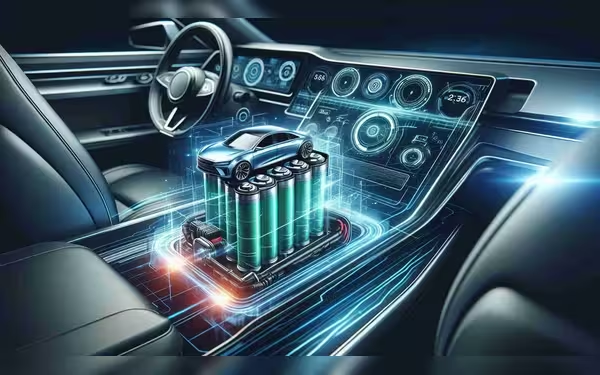Saturday, November 16, 2024 05:40 PM
Huawei's Battery Innovation Set to Transform EV Technology
- Huawei files patent for advanced solid-state battery technology.
- New design enhances ionic conductivity and battery life.
- Solid-state batteries promise safer and more efficient energy solutions.
 Image Credits: phoneworld_pk
Image Credits: phoneworld_pkHuawei's new solid-state battery technology promises to revolutionize electric vehicles with enhanced safety and efficiency.
In recent years, the electric vehicle (EV) market has witnessed a surge in innovation, particularly in battery technology. As the world shifts towards greener alternatives, the demand for efficient and safe batteries has never been higher. One of the leading tech companies, Huawei, has taken a significant step forward by filing a new patent application that could revolutionize the future of battery technology. This innovation is not just a minor tweak; it has the potential to change the landscape of electric vehicles and large-scale energy storage systems.
The patent, titled "Doped Sulfide Materials and Preparation Methods, Lithium-ion Batteries," introduces an advanced solid-state battery concept. Unlike traditional batteries that use liquid or gel-based electrolytes, Huawei's solid-state battery employs a doped sulfide solid electrolyte. This shift is crucial as it addresses several critical issues associated with conventional batteries, such as thermal risks and energy efficiency.
One of the standout features of this new battery technology is its unique structure. The doped sulfide material utilizes a cubic crystal unit cell, with one side doped in nitrogen. This innovative design stabilizes the movement of ions between the anode and cathode, significantly enhancing the battery's ionic conductivity. As a result, users can expect longer-lasting battery life, which is particularly vital for electric vehicles where efficiency and safety are paramount.
Moreover, by replacing liquid electrolytes with a solid-state design, Huawei effectively tackles the common problems of electrolyte breakdown and capacity fading, especially in sulfur-based batteries. Traditional lithium-ion systems often suffer from the settling of polysulfides, which can degrade battery capacity over time. However, the all-solid-state battery technology developed by Huawei prevents this issue, promising a more reliable and durable energy source.
While Huawei has not yet disclosed a specific launch timeline for this groundbreaking technology, industry insiders are optimistic about its potential release as early as next year. This anticipation reflects the growing excitement surrounding advancements in battery technology and their implications for the future of electric vehicles.
Huawei's new battery innovation represents a significant leap forward in the quest for more efficient and safer energy solutions. As the electric vehicle market continues to expand, innovations like these will play a crucial role in shaping a sustainable future. With the promise of improved performance and longevity, consumers can look forward to a new era of electric vehicles that not only meet their needs but also contribute to a greener planet.













